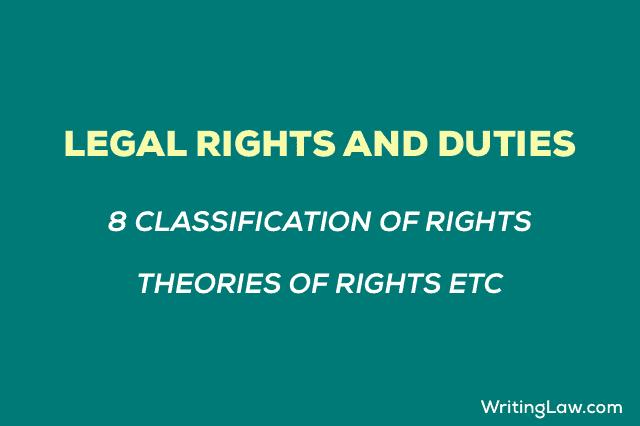Classification Of Legal Rights And Legal Duties
Right means claims, titles, liberties, powers, and immunities summed together. Legal right is an interest which is recognised and protected by the law.
Classification Of Rights
1. Perfect and Imperfect Right
A right that is enforceable by law is a perfect right. But a right which is not enforced by law is an imperfect right.
For Example, Time barred debt
Time barred debt is an imperfect right because it is a right which the law recognizes but is not enforceable.
A debt is time-barred when not returned within the period of limitation. The period of limitation for the recovery of money is 3 years as per the Limitation Act. If the money lender doesn’t sue within three years, then the debt becomes time-barred, and right becomes imperfect.
2. Right in Rem and Right in Personam
Right in Rem → against the whole world.
For Example, the Right to go on a public road.
Right in Personam → against an individual.
For Example, Right to sue an individual for breach of a contract.
Must Read: What Is Right in Rem and Right in Personam?
3. Antecedent Right and Remedial Rights
A substantive law may either be antecedent or remedial. Antecedent right may either be a right in rem or a right in personam.
For Example, Purchaser of certain goods has an antecedent right over the goods so purchased. When antecedent right is violated, then the role of remedial right begins.
4. Proprietary and Personal Rights
A person’s proprietary rights constitute his estate, his assets, and his property. These rights have some economic or monetary significance and are elements of wealth.
For Example, Money in a man’s pocket or bank or land, houses, etc. are proprietary rights.
On the other hand, personal rights are elements of a person’s well being. They have no monetary value.
For Example, Right of reputation, personal liberty, freedom from bodily harm, etc.
5. Right in re-propria and Right in re-alina
Right in re-propria means right over one’s own property.
Right in re-alina means right over the property of someone else.
6. Principal Right and Accessory Rights
The existence of principal right is independent of any other right. But accessory rights are ancillary to principal right.
Principal right
For Example, The Right to alienate property is the owner’s principal right.
Accessory right
For Example, The right to maintenance from husband raises from the rights of the wife being lawfully wedded
7. Vested and Contingent Right
Vested right occurs when all the facts have been completed. Contingent right occurs when some events are necessary to happen.
Vested right
For Example, A is father of S. After the death of A, the property of A will vest in S. It is the vested right of S.
Contingent right
For Example, A has three daughters B, C, and D. A contracts with E, that A will give Rs 2 lakhs to E if E married B. The right of E is contingent in nature.
8. Public and Private Rights
The violation of public rights affects the community as a whole. They are called crimes. Violation of private rights is called civil injuries or tort.
Theories Of Rights
1. Will Theory
2. Interest Theory
Will Theory – Supporters: Hegel, Kant, Hume
According to this theory, a right is an inherent element of the human will. The subject matter of right is derived from human will. The theory suggests that it is through a right that a man expresses his will over an object.
Interest Theory– Supporters: German jurist Ehering
According to this theory, a legal right is a legally protected interest. Ehering says the basis of a legal right is interest and not will. The main object of the law is the protection of human interest and resolve the conflicts between human interests.
However, Salmond criticised this theory of Ehering.
Legal Duties
A duty is an obligatory act. It means it is an act the opposite of which would be a wrong. Thus duties and wrongs are generally co-related. The commission of a wrong is the breach of duty. And the performance of a duty is avoidance of wrong.
Classification of Legal Duties
1. Postitive and Negative Duty
Positive Duties → to do an act.
Negative Duties → not to do an act.
2. Primary and Secondary Duty
A duty may be either primary or secondary. Primary duty is independent. Secondary duty is dependent, but exists for the enforcement of other duties.
3. Absolute and Relative Duties
Absolute duties are those duties that are owed only to the state; breach of which is generally called a crime and remedy is punishment. Relative duties are owed to any person; breach of which is a civil injury (tort), and the remedy is compensation.
Austin also supports the view that certain duties are absolute. They do not have a corresponding right.
For Example, Duty towards God, Duty towards the state, Duty towards himself, Duty towards animals.
- Article 334A of the Constitution of India - 14th April 2024
- Article 332A of the Constitution of India - 14th April 2024
- Article 330A of the Constitution of India - 14th April 2024








